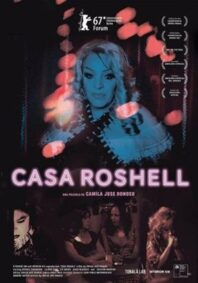
Films, more often than not, depict the climaxes, the ‘big thing’ that happens to its subjects or characters. At first look, Casa Roshell, depicting the patrons of a Mexican trans bar, goes impressionistic, the other direction. Even the ‘locker room talk’ of the trans women talking about their bodies dinging like everyone else reinforces this. But from another perspective, stepping into that locker room is already their ‘big thing’, their silent revolution. In Casa Roshell, these transwomen meet each other, fostering a community that they perpetually have to rebuild. The docudrama hybrid depicts all of this in changing aspect ratios that, mostly, beautifully reinforces the film’s intimate approach.
The film also switches between digital to what looks like 16mm, or a filter that looks like it. I keep ragging on digital and how it makes indoor spaces darker than they really should be. This choice would otherwise be detrimental in a film that depicts a dark bar but it surprisingly isn’t. If anything, it adds an authenticity to these subjects, who are transforming themselves even as they get older. Roshell Terranova, the owner of the titular bar, shows all of her years and not a soul can clock. Casa Roshell is a film of portraits of people who no longer feel shame towards their queerness.
In bridging the gap between documentary and fiction, Camila José Donoso’s Casa Roshell has a lot of authentic moments. A lot of its mid length 71 minutes, outside of dark rooms, has moments that are equally stage-y. The transwomen are empathetic yet resent the fact that some of their one night stands don’t show up. They try to be fair about those no shows, but it’s equally fascinating when they do show up. Either way, there’s a lot of geography talk in this film, about access or how it’s lacking. It’s not easy to be queer and every step and ride to be in the community is difficult.
Every queer person finds their community at their own pace, and doing so produces a lot of results. Casa Roshell doesn’t always depict its titular bar as a perfect place but it is one where kindness prevails. Again, some of the conversations feel like ones we’ve all heard before about feeling like we’re abnormal. But it’s still reaffirming to hear any depiction of a queer person realising that being queer is right. We as queer people need to hear things like this even from people who should know this now. One of the rules of the bar is to not yell but to talk, and talking is good.
Watch Casa Roshell on MUBI.
- Rated: Mature
- Genre: Documentary
- Directed by: Camila José Donoso
- Produced by: Maximiliano Cruz, Sandra Gómez
- Studio: Interior13 Cine, Tonalá Lab

